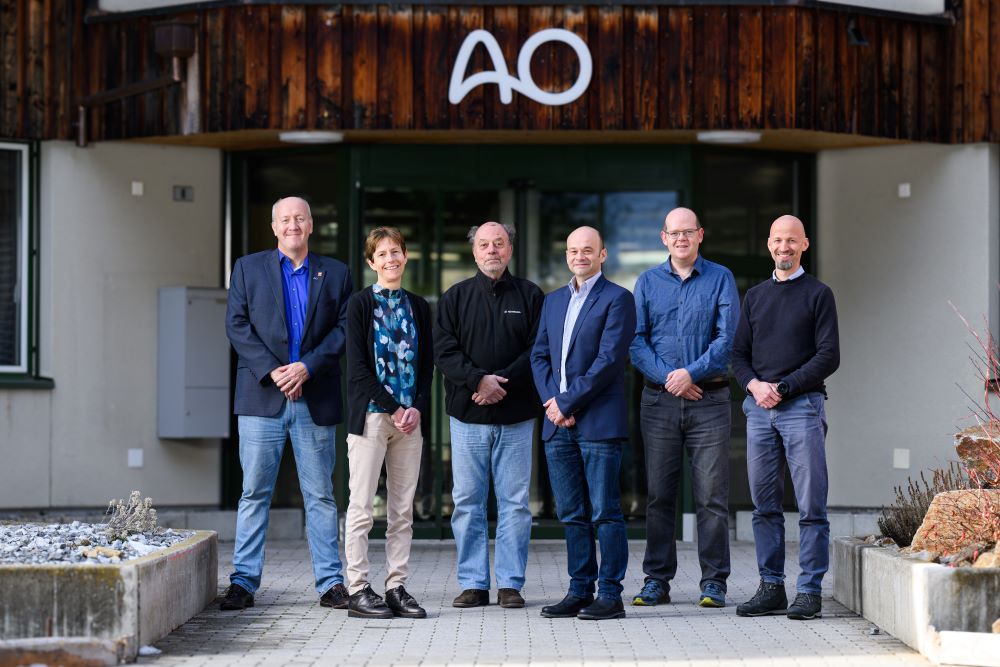ARI researchers among the world’s top two percent of scientists
Seven scientists from the AO Research Institute Davos rank among the most-cited researchers in the world across all scientific fields, according to researchers at Stanford University.

ARI Director Prof R Geoff Richards, Prof Mauro Alini, Emeritus Research Advisor, and Prof Martin Stoddart, Program Leader Regenerative Orthopaedics and Focus Area Leader Progenitor Cell Biology and Mechanoregulation, have been ranked among the most-cited scientists in the world regardless of scientific discipline. They were included in a list compiled by a group of researchers at Stanford University, which measures the impact of scientists' research publications throughout their active careers.
The three also appear in a separate list of most-cited authors in the year 2023, along with three other current ARI scientists: Dr Sibylle Grad, Deputy Program Leader Regenerative Orthopaedics and Focus Area Leader Disc and Cartilage Biology, Dr Matteo D’Este, Focus Area Leader Biomedical Materials, as well as Dr Fintan Moriarty, Focus Area Leader Infection Biology.
This list also includes the late Prof Stephan M Perren (ARI Director from 1967-1996), who passed away in 2019.
"At ARI and the AO Foundation, we are committed to being at the forefront of innovation,” said Stoddart. "The external recognition of our scientists as leaders in their fields validates our achievements and inspires us to push further. The insights from our clinical partners are vital, helping us to ask the essential questions that drive our mission forward."
Stoddart added: "It can also serve as further confirmation that the research conducted at ARI is of a very high quality. As such, it can help us bring in third-party funding for new research projects from institutions such as the European Union or the Swiss National Science Foundation (SNSF)."
Led by Prof John PA Ioannidis, the Stanford University research group first published its database of around 250,000 most-cited authors worldwide across all scientific fields in 2020. Their rankings are based on a composite indicator drawing on six citation metrics from Scopus, an abstract and citation database maintained by the Dutch science publisher Elsevier.
Apart from the composite indicator, the database provides standardized information on citations, h-index, co-authorship-adjusted hm-index, and citations to papers in different authorship positions.
The Stanford researchers maintain two versions of their list: one ranking is compiled using citation data beginning in 1996 to measure the impact of scientists over the course of their entire careers, while the other list focuses on a single calendar year.
The seven ARI representatives appear in the list's latest iteration, published on September 16, 2024.
The three also appear in a separate list of most-cited authors in the year 2023, along with three other current ARI scientists: Dr Sibylle Grad, Deputy Program Leader Regenerative Orthopaedics and Focus Area Leader Disc and Cartilage Biology, Dr Matteo D’Este, Focus Area Leader Biomedical Materials, as well as Dr Fintan Moriarty, Focus Area Leader Infection Biology.
This list also includes the late Prof Stephan M Perren (ARI Director from 1967-1996), who passed away in 2019.
"At ARI and the AO Foundation, we are committed to being at the forefront of innovation,” said Stoddart. "The external recognition of our scientists as leaders in their fields validates our achievements and inspires us to push further. The insights from our clinical partners are vital, helping us to ask the essential questions that drive our mission forward."
Stoddart added: "It can also serve as further confirmation that the research conducted at ARI is of a very high quality. As such, it can help us bring in third-party funding for new research projects from institutions such as the European Union or the Swiss National Science Foundation (SNSF)."
Led by Prof John PA Ioannidis, the Stanford University research group first published its database of around 250,000 most-cited authors worldwide across all scientific fields in 2020. Their rankings are based on a composite indicator drawing on six citation metrics from Scopus, an abstract and citation database maintained by the Dutch science publisher Elsevier.
Apart from the composite indicator, the database provides standardized information on citations, h-index, co-authorship-adjusted hm-index, and citations to papers in different authorship positions.
The Stanford researchers maintain two versions of their list: one ranking is compiled using citation data beginning in 1996 to measure the impact of scientists over the course of their entire careers, while the other list focuses on a single calendar year.
The seven ARI representatives appear in the list's latest iteration, published on September 16, 2024.

